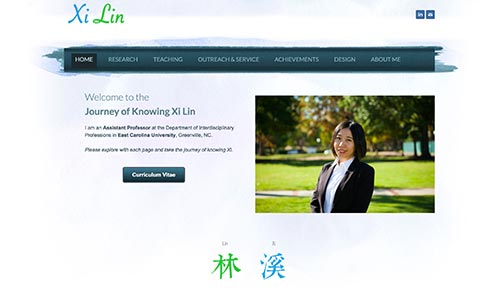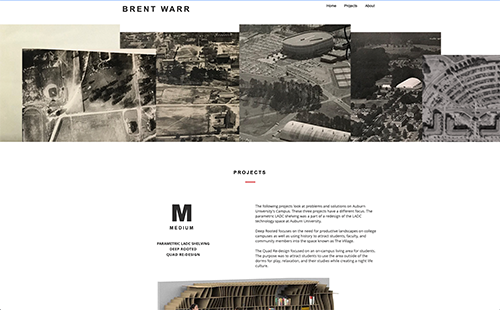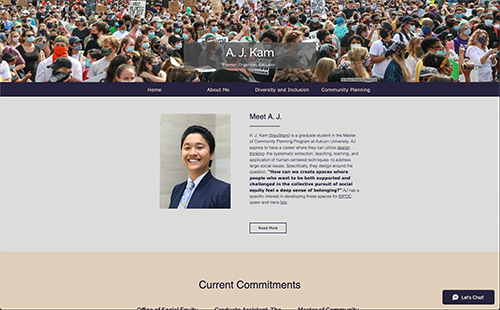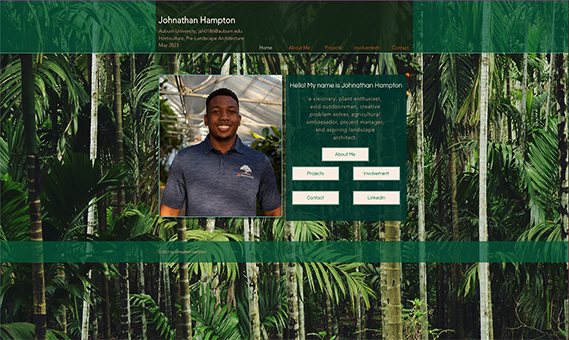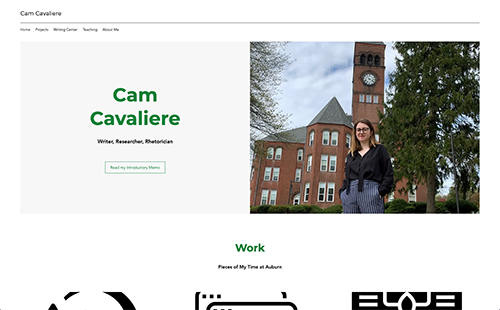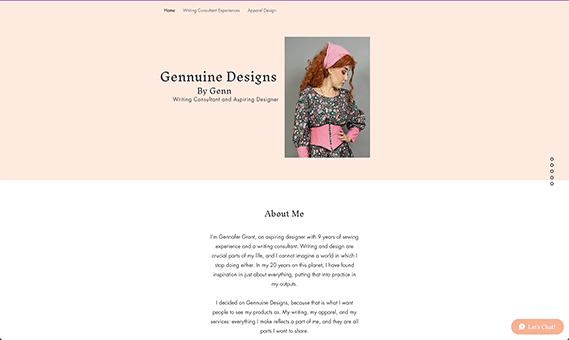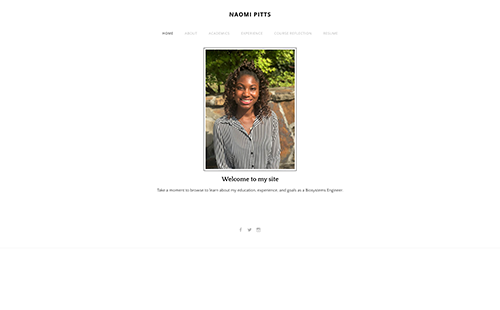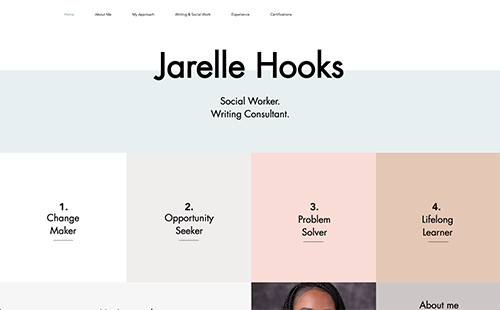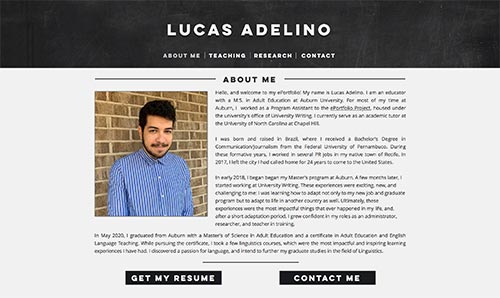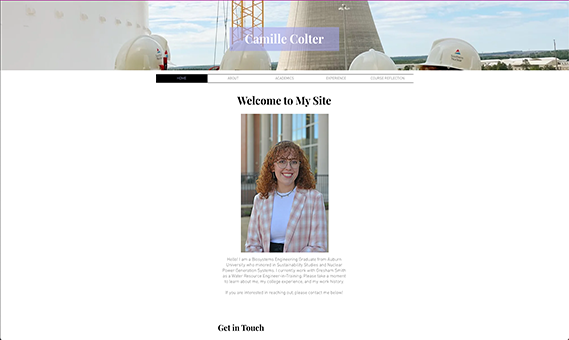Tagged Entries: Reflective Writing
ePortfolios can benefit faculty and staff as they develop their professional brand and communicate their values and work to different stakeholders. An ePortfolio can be one way to tell your professional story through sharing artifacts related to your research, teaching, and service. Use the resources below to help you begin developing an ePortfolio. Be sure to also review our ePortfolio pages that have general information for ePortfolio creators.
Materials designed by Amy Cicchino
This worksheet will help you begin developing your personal brand statement
This worksheet helps you select and contextualize artifacts through reflective writing
Large writing projects, such as dissertations, theses, and research papers, can be daunting. Use these resources to assist you with organizational and time management strategies needed to finish your project. Be sure to see our resources on The Writing Process as you engage in this work.
Materials designed by G. Travis Adams, Katharine Brown, Amy Cicchino, Megan Haskins, Annie Small, and James Truman
This handout provides strategies for approaching large writing projects
This worksheet has tips and reflective questions to help you begin a large writing project
This worksheet introduces you to and helps you begin creating writing goals that are specific, measurable, attainable, relevant, and time-bound.
This handout offers you strategies to developing a regular writing routine
This handout shares strategies for tracking your writing progress, like wordcount trackers, accountability logs, and goal planning
This worksheet can be used to create a weekly writing schedule
This handout invites writers to reflect on their academic identity, celebrate writing successes, and plan their next steps in their large writing project
This brief writing prompt helps writers plan how to use their time productively in a writing session
This worksheet provides two brief writing prompts to use as a warm-up as well as recognize and celebrate moments of growth in writing skills
This writing warm-up encourages writers to affirm their readiness for writing through identifying the strengths they bring to the project
This writing warm-up invites writers to reflect on a semester's worth of writing and recognize moments of growth
The writing process can be stressful, and it is easy to feel anxious about writing, struggle to start writing, or lose focus while writing. Use these resources to implement mindfulness strategies such as meditative pauses, progress tracking, and reflective journaling into your writing routine.
Materials designed by G. Travis Adams, Christopher Basgier, Katharine Brown, Michael Cook, and Annie Small
This brief handout describes writer’s block and explains its causes
This brief worksheet explains solutions to writer’s block and a short reflective writing prompts to help you begin overcoming your own writer’s block
This is a handout useful for instructors as they help students navigate writer's block
This longer worksheet explains some of the causes of writer’s block and writing anxiety, and it offers reflective prompts you can use to manage writing challenges
-
Using Reflection to Manage Writer’s Block and Writing Anxiety Word Document
-
Using Reflection to Manage Writer’s Block and Writing Anxiety PDF
This handout describes the meditative pause, or brief moments in which you deliberately stop writing and check in with your body, your breath, and your mind, before returning to write
The following meditation script, “Focus into Breathing,” can be used before you write as a way of slowing down a busy mind and focusing attention
This activity helps you recognize your patterns of thought about writing and replace self-defeating thoughts with empowering ones to reduce the occurrence of writer’s block and writing anxiety
This activity combines Cognitive Behavioral Therapy (CBT) and contemplative and embodied pedagogies to help writers externalize and silence an overly harsh inner critic
This brief writing prompt helps writers plan how to use their time productively in a writing session
This worksheet guides you in using expressive writing for self-discovery. You will learn about different types of expressive writing, such as answering prompts or making gratitude lists, and can complete several reflective prompts.
This worksheet provides two brief writing prompts to use as a warm-up as well as to recognize and celebrate moments of growth in writing skills
This writing warm-up encourages writers to affirm their readiness for writing through identifying the strengths they bring to the project
This writing warm-up invites writers to reflect on a semester's worth of writing and recognize moments of growth
Personal statements are often part of the application process for prestigious scholarships and graduate or professional school applications. Use these resources to identify your goals and the expectations of your audience so that you can craft an effective personal statement. If you are applying for a Fulbright grant, please also see our resources specific to Fulbright.
Materials designed by Katharine Brown, Emily Cosgrove, Annie Small, and James Truman
This toolkit introduces personal statements and offers step for producing an effective personal statement
This worksheet will guide you in analyzing an example personal statement
These open response questions will help you brainstorm and pre-write for your personal statement
Once you have brainstormed, this worksheet will help you outline your personal statement
This worksheet will help you reflect and self-assess a personal statement draft to consider opportunities for revision
Reflective writing helps you critically think about your learning, respond to new knowledge, connect your learning experiences, and consider how new knowledge aligns to your professional and developmental goals. Use the resources below to learn more about reflective writing, including how to design reflective writing prompts.
Materials designed by Amber Simpson, Animal Sciences Academy Team, Christopher Basgier, ePortfolio Project, Heather Stuart, Lindsay Doukopolous, Margaret Marshall, and Parker Wade
This handout provides a brief introduction to reflective writing along with sample questions that can support reflective thinking
This handout introduces you to the six Rs of reflection: reporting, responding, relating, reasoning, reconstructing, and repackaging. Bain, J., Ballantyne, R., Mills, C. & Lester, N. (2002) labeled these levels with the mnemonic “5 Rs of reflection.” We have added a sixth level to this framework to account for the way reflection moves into other genres, such as an ePortfolio or personal narrative
This handout will take you through a heuristic process aimed at developing an effective reflective writing assignment for students keeping in mind the expected learning outcomes
-
A Heuristic for Developing a Reflective Writing Assignment Word Document
-
A Heuristic for Developing a Reflective Writing Assignment PDF
Reflection can take many different forms, and any number of strategies can help you support students’ reflective practices. This handout lists various prompts and questions you can adapt to your specific course context and objectives
This handout is meant to inform you on the benefits of using reflective writing in lab contexts
-
Assigning Reflective Writing Prompts in Lab Settings Handout Word Document
-
Assigning Reflective Writing Prompts in Lab Settings Handout PDF
This worksheet guides you in using expressive writing for self-discovery. You will learn about different types of expressive writing, such as answering prompts or making gratitude lists, and can complete several reflective prompts.
This handout gives three example reflective writing assignments from different disciplines, each fostering a different goal related to reflective practice
This worksheet will help you consider questions that are important as you develop a reflective writing prompt for your course
Once you’ve developed your reflective writing prompt, this peer reviewguide can help you get feedback.
-
Peer Feedback on Reflective Writing Prompts (for Faculty) Word Document
-
Peer Feedback on Reflective Writing Prompts (for Faculty) PDF
This worksheet provides examples of student reflections in need of feedback and guidance which you can use to practice providing feedback that helps students improve their reflective writing
This rubric was created as part of our ePortfolio Project. However, you can use or adapt it to assess reflective writing in ePortfolios
A successful writing group can help you take personal accountability for your writing progress and give you a support network of other writers. Writing groups can help you create a writing routine, give and receive feedback on your writing, and help you talk through writing blocks.
Materials designed by Katharine Brown, Amy Cicchino, Megan Haskins, Margaret Marshall, and Annie Small
This handout will introduce you to writing groups and offer some considerations for you as you organize your own writing group
This worksheet introduces you to and helps you begin creating writing goals that are specific, measurable, attainable, relevant, and time-bound
This handout offers you strategies to developing a regular writing routine
This handout shares strategies for tracking your writing progress, like wordcount trackers, accountability logs, and goal planning
This worksheet can help your writing group determine what progress looks like for you and track that progress.
This worksheet can be used to create a weekly writing schedule
This reflective, discussion-based activity invites writers to evaluate their growth and discuss with group members areas of desired growth
This group conversation starter invites each group member to identify one writing skill of which they are proud and share it with the group
This activity invites writing groups to compose a letter to each other sharing how the writing group has been of support
Writing-to-learn activities are low-stakes writing prompts that help students engage with content knowledge, think critically, and practice applying their learning. Use the resources below to learn more about writing-to-learn and how it might play a role in your course.
Materials designed by Christopher Basgier, Alyssa Pratt, and Djibo Zanzot
This worksheet is designed to help you understand some of the features of an effective writing-to-learn (WTL) prompt. Remember that these features are not necessarily a checklist: some prompts will include and exclude different features depending on what is appropriate for your course and field
-
Features of Effective Writing-to-Learn Prompts Worksheet Word Document
-
Features of Effective Writing-to-Learn Prompts Worksheet PDF
This handout includes a range of writing assignments and activities you can ask students to complete in your course in order to promote their learning. Many of these assignments can have high stakes or low stakes versions
This worksheet will help you identify and define a difficult concept, and then map different levels of understanding for that concept. You can use these definitions as a basis for crafting your writing-to-learn assignments
Artifacts show evidence of your experiences, knowledge, and skills and can be anything: videos, photos, internship experiences, study abroad experiences, research posters, and course projects. You’ll want to contextualize your artifacts with reflective writing, which can connect your specific artifacts to your larger professional goals and personal brand.
Materials designed by Amber Simpson, Heather Stuart, and Parker Wade.
This handout offers examples of artifacts that you might potentially include in your ePortfolio. Remember, artifacts can be any kind of media
This worksheet will help you brainstorm artifacts and connect your artifacts to the skills that you are trying to showcase
Reflective writing allows you to articulate why an experience is important, what you learned during the process, and how you plan to apply your skills to future projects or endeavors. This handout gives you questions that you can use to begin drafting reflective writing for artifacts in your ePortfolio
This worksheet will guide you in drafting reflective writing for an artifacts in your ePortfolio
You can see how students at Auburn share and contextualize their artifacts by visiting our ePortfolio gallery
Below are links to ePortfolios from Auburn University students and alumni. Here you will find a variety of ePortfolios that include thoughtful reflections and relevant artifacts that showcase student learning to audiences outside the University.




